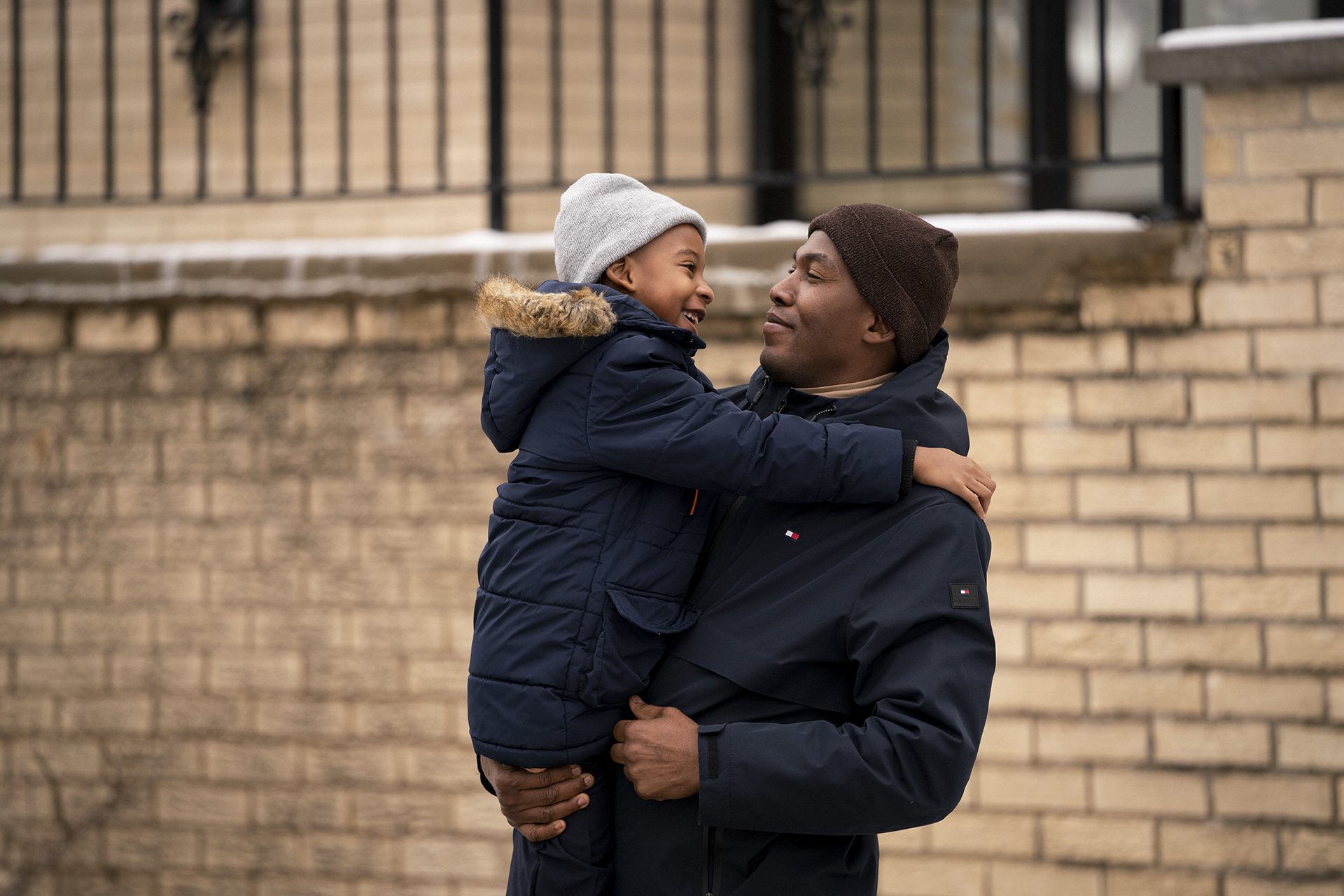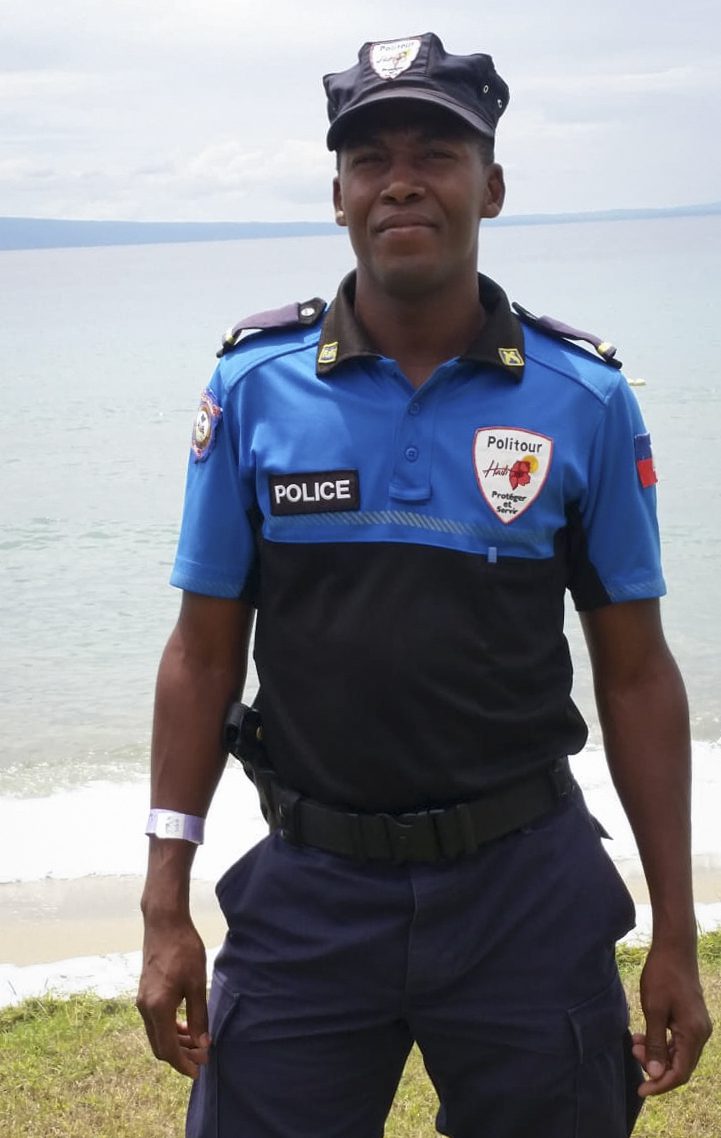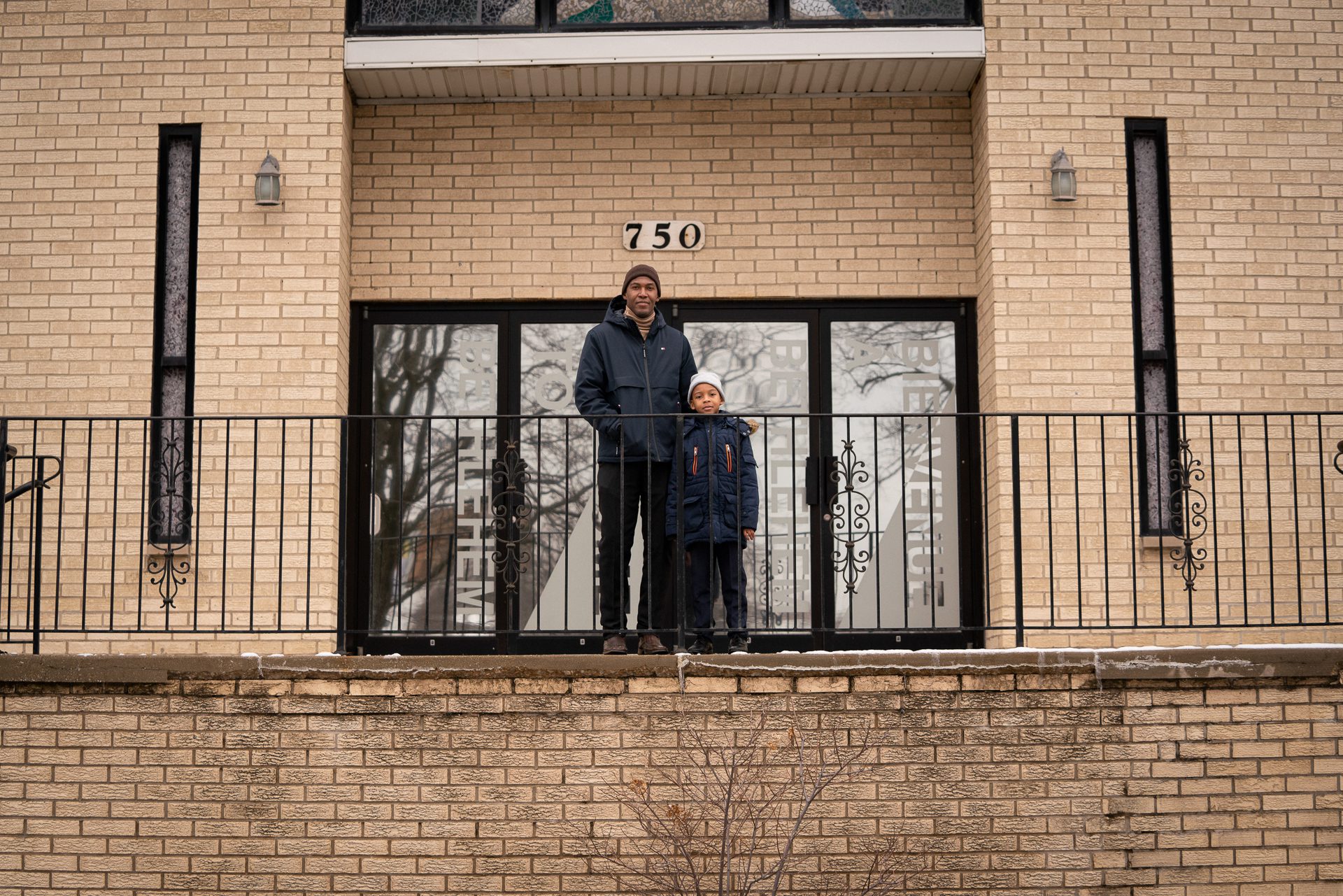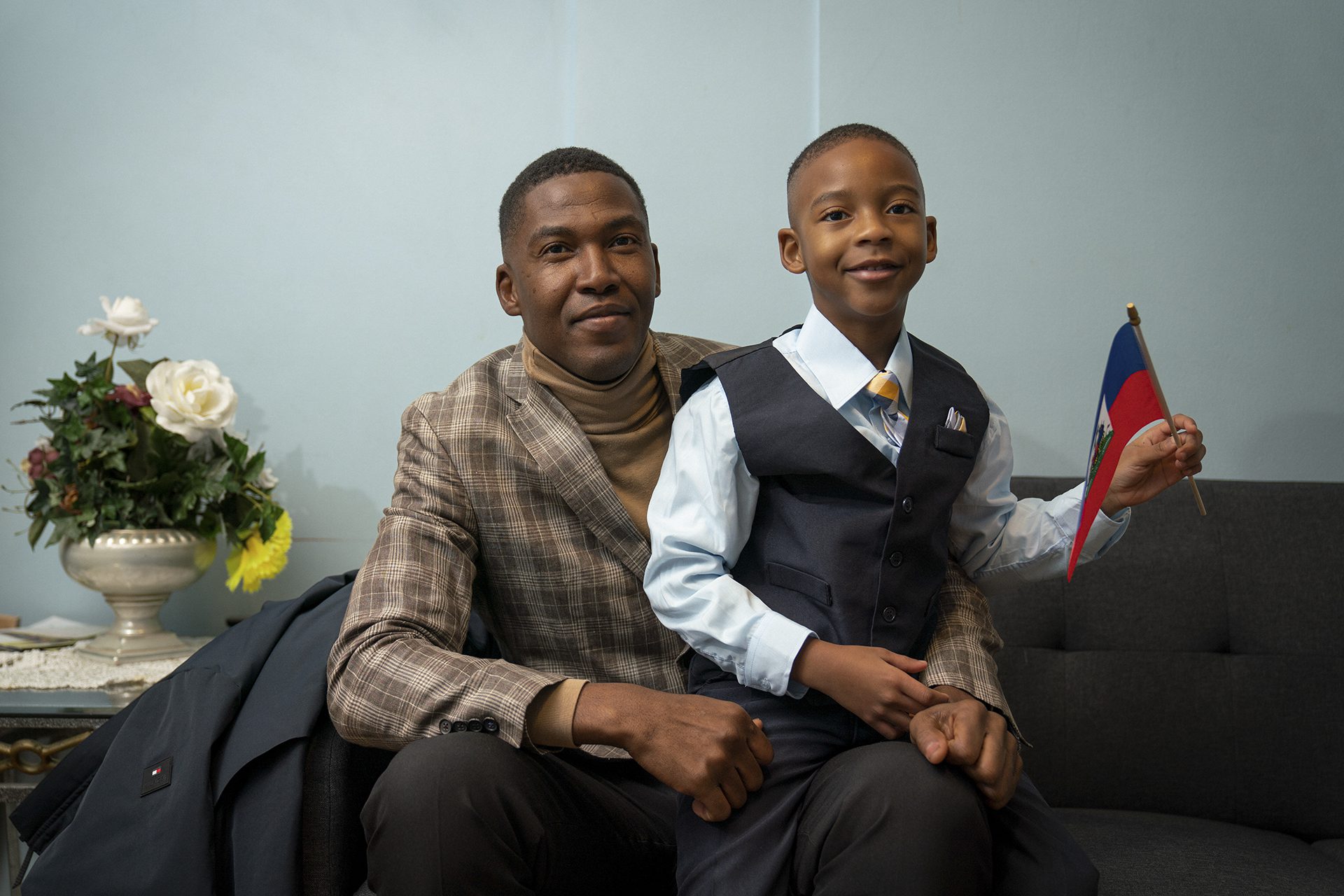 Martine Séverin para Borderless Magazine
Martine Séverin para Borderless MagazineEra policía en Haití. Se marchó con su hijo tras ser amenazado por miembros de una banda. Ahora espera a su familia en Chicago.
Estimaciones de Pew Research 1 de cada 10 negros en Estados Unidos es inmigrante. En Inmigrantes negros hoyBorderless Magazine habló con inmigrantes negros de Chicago sobre sus hogares, sus vidas y los retos a los que se enfrentaron al llegar a Estados Unidos.
El policía Jean Chrisbene Justin vio la creciente inestabilidad en su país natal, Haití, en 2020 y decidió que era hora de marcharse. No estaba solo. Más de 100.000 haitianos desplazados en 2021. El aumento de la violencia de las bandas, la inestabilidad política, así como las catástrofes naturales y los fenómenos meteorológicos extremos siguen provocando desplazamientos.
Noticias que ponen el poder en el punto de mira y a las comunidades en el centro.
Suscríbase a nuestro boletín gratuito y reciba actualizaciones dos veces por semana.
"No era seguro", dijo Justin a Borderless. "Me dije: esto no es bueno. Tengo que irme". En 2021 llegué a Chicago con mi hijo. Ahora estoy esperando hasta finales de este año, en septiembre, cuando los tribunales de inmigración tomen una decisión sobre mi caso [de asilo]."
RefugeeOne es una organización sin ánimo de lucro que atiende anualmente a más de 2.500 refugiados e inmigrantes de todas las edades y procedencias. Actualmente están ampliando su programa de solicitantes de asilo para haitianos y ayudan a Justin con su caso de asilo.
Borderless Magazine habló con Justin sobre la creciente agitación en Haití, su viaje a Estados Unidos con su hijo y la espera para reunir a su familia en Chicago.

Nací y crecí en Croix-des-Bouquets -lugar de nacimiento del rapero Wyclef Jean- y soy el mayor de mis hermanos y hermanas. Las lenguas oficiales de Haití son el francés y el criollo, por lo que hablo varios idiomas, entre ellos el inglés y el español.
Quería ser policía porque quería servir y proteger a la gente. Entré en el departamento de policía de Haití el 27 de diciembre de 2013. Estuve en el equipo de policía turística, PoliTour, y estuve con ellos siete años hasta que me fui de Haití. Me encantaba el trabajo. Hice mi trabajo con todo mi corazón y mis conocimientos.
Yo trabajaba en el aeropuerto internacional Toussaint Louverture y veía a mucha gente intentando salir del país. El aumento de las bandas y la violencia empezó por el deseo de tener poder. Diputados y senadores utilizan sus campañas para distribuir armas a los líderes de las bandas. Hay mucha corrupción con nuestros políticos que está directamente ligada al movimiento pandillero y a la mentalidad pandillera. En cada barrio hay una banda. Las escuelas y los servicios públicos cierran cuando las bandas se vuelven más violentas.
Uno de mis amigos fue asesinado a tiros. Si el si las bandas descubren que eres policía, irán a tu casa y te matarán.. La policía no tiene ningún control. Más de una vez, miembros de bandas intentaron matarme. Trabajaba en la seguridad exterior del aeropuerto internacional y recibía amenazas porque a menudo tenía que detener a personas que querían intimidar a los turistas. Tenía problemas todos los días al terminar mi turno, recibía amenaza tras amenaza, así que decidí que era hora de marcharme. Ya era suficiente.

Me llevé a mi hijo Oliver, que entonces tenía cuatro años, y dejé a mi mujer y a mi hija de tres meses. De Haití llegué a Brasil, pero me quedé poco más de un año porque la situación allí tampoco era buena. Para ganarme la vida, vendía picolé, que son paletas al estilo brasileño, y otras cosas para ganar dinero, pero no era suficiente. Intenté solicitar un visado para mi mujer en Brasil, pero se lo denegaban a todo el mundo debido a la inestabilidad de Brasil.
Tenía que cuidar de mi familia, así que decidí salir de Brasil en agosto de 2021 y entonces mi hijo y yo viajamos por Bolivia, Perú, Ecuador y Colombia. Desde allí, caminamos por la selva durante 11 días hasta llegar a Panamá. Es un pasaje que hacen muchos. Durante todo el camino, conocimos a otros inmigrantes.
Perdí peso durante aquellos días en la selva tropical de Panamá. No me gusta pensar en aquella época porque vi morir a mucha gente. Había muertos en la selva y en el agua. También algunos niños y bebés. A veces, mi hijo me lo recuerda diciendo: "Papá, ¿te acuerdas de la gente que vimos en la selva?".
Llegamos a México, después de pasar por El Salvador y Guatemala, y nos quedamos unos meses, pero allí tampoco fue fácil. Como no tenía papeles, no podía trabajar ni enviar dinero a mi familia. Finalmente, decidí llegar a Estados Unidos en barco, pero nos atraparon. Me encarcelaron durante 13 días, pero finalmente me liberaron y me permitieron trasladarme a Chicago, donde vivía mi amigo, que también es haitiano.

Llevo un año en Chicago. Vivo con mi amigo y no tengo papeles, así que no trabajo. A finales de este año, en septiembre, tengo una reunión con los tribunales de inmigración donde decidirán mi caso de asilo.
Mi padre era carpintero en Haití, así que aprendí lo mismo de él. Con la ayuda de RefugeeOne, mi hijo, que ahora tiene cinco años, está matriculado en la escuela. Conocí RefugeeOne a través de un amigo, y la organización me está ayudando con el papeleo.
Mi estancia en Chicago ha sido buena y la gente de aquí es amable. Me han aceptado. Todos los domingos voy a una iglesia en la que hay muchos haitianos. Asisto a clases en el Olive-Harvey College y estoy trabajando en mi inglés. Tengo un nivel de quinto grado.
Con el tiempo me gustaría volver a casa. Haití es un gran país: el mar, el sol y la arena. Es un lugar donde puedes tomártelo con calma. Pero la política de mi país no es buena. Las bandas están fuera de control. Hay protestas en las calles y la gente quema neumáticos. Ahora no puedo volver.
Todos los haitianos quieren irse, y la única razón por la que se quedan es que les resulta difícil salir. Quiero que toda mi familia esté aquí conmigo, y estoy trabajando para traer a mi mujer y a mi hija. Pero ahora lo único que puedo hacer es esperar. Espero mi cita en el tribunal de inmigración. Espero a que mi familia se reúna conmigo. Espero hasta que algún día pueda volver a mi país cuando sea seguro.
Este reportaje se ha realizado siguiendo el método colaborativo de Borderless Magazine. Para saber cómo creamos historias como éstas, consulte nuestro explicación visual.

